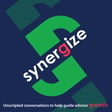
Ep. 6: Dr. Lamar Pierce: Capitalizing on the Power of Human Interaction
While behavioral finance isn’t new, it hasn’t been readily adopted in the wealth management space.
But as technology encroaches on the more transactional aspects of our business, can applying behavioral finance principles to their personal interactions with clients give RIAs a competitive edge?
In this episode, Dr. Lamar Pierce, Professor of Organization and Strategy at Washington University, joins guest host Ryan Neal, Senior Editor at TradePMR, to dive into this question.
Listen as they explore:
- Practical ways that RIAs can leverage behavioral finance to help build enterprise value
- Why advisors should think carefully about which parts of their business will be technology-driven and which will be driven by personal interactions with clients
- How generational differences might impact an advisor’s ability to grow and transition their businesses
Subscribe now, and connect with us on social media:
YouTube
Get the transcript for this episode, with sources, at
https://synergize.advisorevolutionsciences.com/
About Dr. Lamar Pierce
Lamar is a Professor of Organization & Strategy at the Olin Business School at Washington University and a Behavioral Strategy Advisor at Atlas Point.
He holds a PhD in Business from the University of California, Berkeley and an undergraduate degree in economics from the University of Puget Sound.
Lamar Pierce and Washington University are not affiliates of TradePMR.
More About Lamar:
LinkedIn: https://www.linkedin.com/in/lamar-pierce-2988546/
Website: https://olin.wustl.edu/faculty/lamar-pierce2
If you want to join the conversation or connect with us, please visit us at synergize.advisorevolutionsciences.com. This content is provided for general informational purposes only. The views expressed by non-affiliated guest speakers are their own, and do not necessarily reflect the opinion of TradePMR or its affiliates.
TradePMR and its affiliates do not endorse any guest speakers or their companies, and therefore give no assurances as to the quality of their products and services. This channel is not monitored by TradePMR. TradePMR does not provide investment advice, tax advice or legal advice. TradePMR is a Member of FINRA and SIPC. Trade-PMR, Inc. is registered with the Securities and Exchange Commission (SEC) and the Municipal Securities Rulemaking Board (MSRB). TradePMR provides brokerage and account services to registered investment advisors. Custodial services provided by First Clearing. First Clearing is a trade name used by Wells Fargo Clearing Services, LLC, Member SIPC, a registered broker-dealer and non-bank affiliate of Wells Fargo & Company. Copyright 2024 Trade-PMR, Inc.
For a transcript of this episode, with sources, visit

